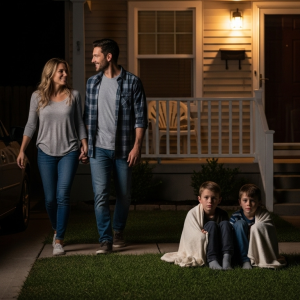“We’re taking your office space,” my father announced over dinner last night. It wasn’t a request; it was a decree. I was halfway through a burger when he dropped the words as casually as if he were commenting on the weather. My stomach coiled into a tight knot, but I forced a weak, pathetic smile and mumbled, “Fine, whatever. I’ll clear it out tomorrow.”
Inside my head, however, a storm was raging. Are you serious with this nonsense again? I’m 26, with a Computer Science degree, still living at home because Bay Area rent is a cruel joke. I’ve been trying to build my web development business from the ground up, and that “office space” wasn’t just a room. It was the converted garage where I’ve poured 60-hour weeks for the past three years, hustling for clients and building a portfolio.
All this, while paying my parents $850 a month in rent, plus utilities, and covering groceries half the time. My younger brother, Ethan, 19, sat across from me, a smug little smirk playing on his lips. He is the golden child extraordinaire, a two-time community college dropout who my parents still believe is destined for greatness.
He wanted my workspace for his “streaming career,” which, as far as I could tell, consisted of him playing Valorant badly for an audience of about twelve people.
“Ethan needs the space for his equipment,” my mother chimed in, her eyes glued to her phone. “His followers are really growing, and this could be his big break.”
Yes, all 38 of them. Meanwhile, I had just landed a $5,000 contract that conveniently paid for the new water heater when theirs gave out over Christmas. Not that anyone bothered to thank me for it.
“Plus,” my dad added through a mouthful of fries, “your brother needs privacy. The living room isn’t cutting it.”
Privacy. For the kid who had never contributed a single dollar to this household. I, on the other hand, had re-shingled the roof last summer, fixed my mom’s car when it broke down, and upgraded the entire home network when my dad wouldn’t stop complaining about his Netflix buffering. I have sunk at least $9,000 into this house in the last year alone, yet they treat me like a tenant they’re doing a favor.
Ethan’s grin widened. That’s how it has always been: him taking, me giving. When I made the honor roll, they would nod. When he passed a class with a C-minus, they took him out for ice cream.
I stabbed at my fries, and a splatter of ketchup stained the tablecloth. My mom frowned at the mess, but I was too angry to care. The garage was my sanctuary, my one claim in a house where I felt like a guest. And now, even that was being taken away.
“You can set up in the basement,” my dad offered, as if bestowing a great gift. The basement, with its half-finished walls, cold concrete floor, and a persistent mildew smell. The place where the Wi-Fi signal goes to die and they store two decades of accumulated junk. I just nodded. What else was there to do? I had spent a lifetime being the reasonable one, the responsible one, while they catered to Ethan’s every whim.
That night, I sat in my garage office, looking at the space I had built. The custom desk I’d made from reclaimed wood, the perfect cable management, the sound-dampening panels I’d installed myself. Three years of my life, my work, my dream. And they were handing it over to a teenager who couldn’t be bothered to wash his own dishes. Something inside me, something I had suppressed for years, finally snapped.
The dynamic was set in stone from childhood. If I got a B+, my dad would ask, “Why wasn’t it an A?” If Ethan got a C-minus, they’d celebrate like he’d won a Nobel Prize. “He’s just wired differently,” my mom would say. “He needs more support.” I was the one who had his act together, which was their code for being the child they didn’t have to worry about, so they simply didn’t.
When I was sixteen, I worked for six months to save up for my first laptop. Ethan received the newest iPhone for his twelfth birthday because “all his friends had one.” I fought for a scholarship to a state university; they paid for him to flunk out of community college, twice, blaming the professors for not understanding his “learning style.”
When I moved back home after graduating, the deal was simple: I’d pay rent until I was established. But somehow, my role expanded to in-house tech support, handyman, and emergency family fund. Last year, when the furnace died in the middle of January, the $2,700 repair bill came out of my savings, with a vague promise of being paid back “soon.” I’m still waiting.
Three months ago, my dad’s car needed a new transmission. That was $1,800 from my client funds. Last summer, I spent two weeks of my “vacation” rebuilding their rotting deck, paying for materials and doing all the labor while Ethan played video games inside. When they hosted a barbecue to show it off, my dad joked, “Yeah, got it done for cheap!” never once mentioning that I was the one who built the darn thing.
Every attempt I made to discuss this imbalance was met with my mom’s tears or my dad’s defensive mantra: “Family helps family.” But the help only ever flowed in one direction.
So, losing the garage wasn’t just about losing a room. It was the final, undeniable proof that in this house, my contributions meant nothing, and Ethan’s whims meant everything. That night, I lay awake, cataloging every slight, every sacrifice, every time I had swallowed my anger to keep the peace. No more.
The next morning, I skipped breakfast. I couldn’t bear to see Ethan’s smug face. Instead, I sat in my car in the driveway and started scrolling through apartment listings. I had been saving, but I thought I needed at least another year. I didn’t care anymore. I’d live on ramen noodles if it meant I could have my own space.
I found a studio in Oakland. It was small and the kitchen was dated, but it had a decent-sized alcove perfect for my desk setup. $1,850 a month. The landlord required first, last, and security deposit, a total of $5,550 upfront. I had $8,200 in my savings. It would be tight, but it was possible.
I fired off an email. Within an hour, I got a response. The landlord, an older woman named Janet, could show it to me that afternoon. The place was exactly as advertised: clean, quiet, and most importantly, free of my family.
“I’ll take it,” I told Janet. I signed the lease, paid the deposit, and held the keys in my hand. Just like that, I had an escape plan. Driving home, a strange mix of triumph and fury washed over me. The resource they had been exploiting was about to dry up.
I didn’t tell them about the apartment. When my mom texted asking me to pick up groceries, I simply replied, “Sure.” But instead of the usual $200 haul, I walked in with a single bag containing only milk and bread.
“Where’s the rest?” she asked, bewildered.
“Budget’s tight this month,” I said with a shrug. “Figured we could all chip in.” The look on her face was priceless.
My dad was in my garage, measuring for Ethan’s new $600 gaming desk—money they could magically find for him, but not to repay the $4,500 they owed me. “Hey, the printer’s jammed again,” he called out. “Can you take a look?”
“Can’t,” I said, walking past him. “Client deadline.” That night, the printer remained jammed. My mom had to go to a print shop. It was a small victory, but it felt incredible.
Over the next few days, I began my campaign of passive resistance. When Ethan asked for a ride, I told him to take the bus. The lawn, which I mowed every Sunday, grew shaggy. The dishes piled up. The Wi-Fi, which I usually reset daily to keep it stable, started dropping constantly. The small, invisible tasks I performed were suddenly very visible in their absence.
My dad finally approached me, hovering awkwardly in my doorway. “Is something wrong, Ryan? You seem off lately.”
“Just busy with work,” I said blandly.
“Well, we’re family,” he said, falling back on his favorite line. “We all need to pitch in.”
“Sure,” I replied. “I’ll add it to the list.” I was definitely keeping score.
The real bombshell dropped that afternoon. I was on a client call when my dad knocked. “Hey,” he said, looking guilty. “I sold your workbench. Got $300 for it.”
My custom workbench. The one I had built with my own hands. My voice was dangerously calm. “You sold my property without asking me?”
“Well, Ethan needs a proper streaming desk,” he stammered. “I figured you’d be fine with it. It’s for your brother’s career. Look, we’ll split it with you. You can have $100.”
A third of the money for my own property. “Keep it,” I said, turning back to my computer. “Consider it my investment in the Bank of Ethan. It’s where all my money seems to end up anyway.”
As soon as he left, I booked a U-Haul for Saturday morning.
By Friday, I had secretly moved about 70% of my belongings to the new apartment. The family dynamic was deteriorating fast. Ethan had made a mess of the lawn, my dad had broken the printer even worse trying to fix it, and my mom was constantly complaining about the state of the house.
That night, my dad followed me to my room as I packed my last few essentials. “Ryan, what is going on with you lately? Your mother’s worried.”
“Nothing’s going on,” I said, my voice neutral. “Just establishing some boundaries.”
“Boundaries? We’re family!”
There it was. The magic word that was supposed to excuse everything. “Yes, we are,” I agreed. “Which is why it’s interesting that when Ethan wants something, it’s ‘we need to support each other.’ But when I need something, it’s ‘you’re an adult, figure it out.’”
His face flushed. “That’s not fair! We let you live here, don’t we?”
“I pay rent,” I shot back. “$850 a month, plus utilities, plus groceries, plus every emergency repair this house has needed for the past three years. I’m not living here, Dad. I’m subsidizing all of you.”
He couldn’t form a coherent response. He didn’t have an answer when I asked him to name one time he’d put my needs first. He didn’t have an answer when I asked him how much Ethan had ever contributed.
He just sputtered, “We… we didn’t think…”
“No,” I cut him off, turning back to my closet and pulling out the last of my clothes, no longer hiding it. “You didn’t.”
“What are you doing?” he asked, his voice suddenly uncertain.
I stopped and looked him dead in the eye. “I’m moving out tomorrow.”
The shock on his face was almost comical. “Moving out? Where? Why didn’t you tell us?”
“I signed a lease last week, and I’m telling you now. I guess you figured I’d just keep bankrolling this household while you catered to Ethan. That was the plan, wasn’t it?” He didn’t deny it. That told me everything I needed to know. The ATM was finally leaving.
Saturday morning, the U-Haul was parked in the driveway. My family watched from the porch in various states of distress as I carried out my last few boxes.
My mom was crying, her go-to manipulation tactic. “I don’t understand why you’re doing this. Why not talk to us first?”
“Like you talked to me before deciding to take my workspace?” I replied without breaking my stride.
My dad alternated between anger and bargaining. “This is childish, Ryan! Running away because you didn’t get your way!”
“Not running away,” I corrected, hefting my computer tower into the truck. “Moving on. There’s a difference.”
Ethan was sulking, his grand streaming career suddenly in jeopardy. “What about my desk?” he whined.
“Dad already sold yours,” I said. “Sounds like a you problem.”
My mom followed me back into the house. “I just don’t understand where this is coming from. We’re family!”
I stopped, set down the box I was carrying, and faced her. “Let me make it crystal clear, then.” I walked to the kitchen, grabbed a marker, and on a piece of paper, I wrote:
Ryan’s Contributions (Last 12 Months):
- Rent Paid: $10,200
- Utilities/Groceries: ~$6,600
- Furnace Repair: $2,700
- Dad’s Transmission: $1,800
- Deck Rebuild: $1,100 + 80 hrs labor
- Total: $22,400+
Ethan’s Contributions:
- Total: $0
I stuck it to the fridge with a magnet. “That’s where this is coming from.”
They stared at the list, their faces draining of color. They tried to protest, to argue the numbers, but I had the receipts. “We’ve been meaning to pay you back,” my mom started.
“Save it,” I cut her off. “I don’t even care about the money anymore. What I care about is that you treat me like I’m the selfish one while you enable him to contribute nothing. He’s nineteen, not a child.”
“But what about the utilities?” my mom asked, her voice cracking as the reality set in.
“My name is off everything as of Monday,” I said calmly. “You have 48 hours to figure it out.”
I closed the U-Haul’s rear door and climbed into the cab. My mom was openly sobbing. My dad looked shell-shocked. Ethan was furiously texting. As I pulled away, I glanced in the side mirror. For the first time in their adult lives, they were going to have to solve their own problems.
The first week in my new apartment was blissful. The silence was glorious. The texts and calls from my family, however, were not.
Mom: The internet’s not working. Did you really cancel it? Dad: The hot water heater is making a strange noise. Ethan: My streaming setup won’t connect!
I ignored most of them. When my mom pleaded for me to come over for just an hour, promising to pay me, I replied, “My contractor rate is $95 an hour, two-hour minimum, payment upfront.” That ended the conversation quickly.
Ten days after I moved out, the real crisis hit. My dad called in a panic. “The furnace quit again. The house is freezing.”
“Call the HVAC company,” I suggested.
“We don’t have that kind of money right now, Ryan, please!” he begged. Of course they didn’t. I had been their safety net for years.
I let him stew for a moment. “Look,” I finally said. “I’ll make you a deal. I will come and fix the furnace, this one time. In exchange, we are going to have a serious family meeting about finances and responsibilities. All cards on the table. And Ethan starts contributing. Real contributions, not promises.”
He agreed immediately. That night, I fixed their furnace in an hour. Then, I sat them down at the kitchen table and laid out a budget. It included a non-negotiable $250 a month in rent from Ethan.
“That’s not fair!” he protested. “I don’t have any money!”
“That’s why you’ll get a job,” I explained, as if to a toddler. “McDonald’s is hiring.”
To my utter shock, my dad backed me up. “Your brother is right, Ethan. Things need to change.” The look of betrayal on Ethan’s face was a sight to behold. He stormed out, but the message was clear. The old dynamic was broken.
It’s been six months since I moved out, and the transformation has been stunning. Ethan, faced with the reality of contributing or being kicked out, got a job at a warehouse. He was just promoted to shift lead. My dad dug out his old tools and has become surprisingly proficient with YouTube tutorials. My mom created a real budget and has stuck to it.
Last weekend, I went over for dinner. When the dishwasher started making a strange noise, my dad didn’t look at me. He turned to Ethan. “Can you take a look at that tomorrow? Probably something caught in the filter.” And Ethan just nodded, like it was the most normal thing in the world.
Later, my dad walked me to my car and handed me an envelope with $500 cash. “It’s not everything we owe you,” he said, looking at his shoes. “But it’s a start. We should have done better by you, Ryan. I’m sorry.”
The biggest shock came a week later, via text, from Ethan. “Hey, got a bonus at work. Wanted to pay you back for the workbench dad sold. It was a jerk move. Let me know your Venmo.” Ten minutes later, $300 hit my account. It wasn’t about the money. It was the recognition.
Now, my relationship with them is different. It’s controlled, with firm boundaries. I don’t lend money, and I’m not their on-call repairman. But it’s based on a newfound, hard-won mutual respect. My scorched-earth exit was the best thing that could have happened to us. It forced them to grow up, and it allowed me, for the first time, to truly build a life of my own.




